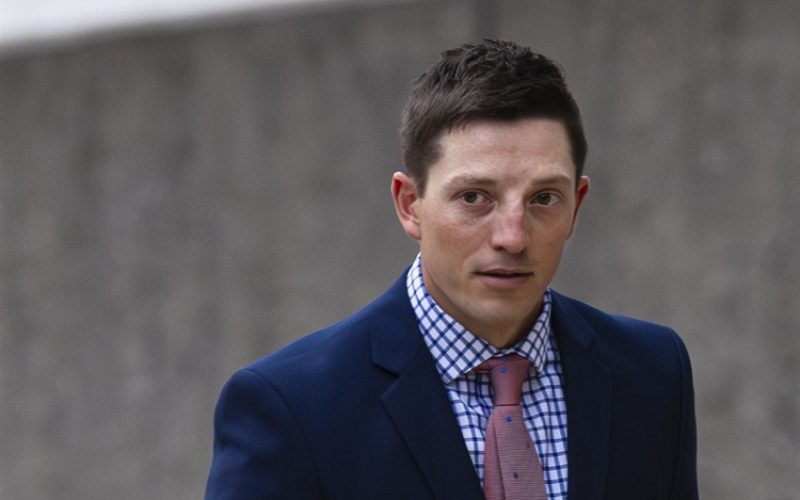Lansing, MI – The jury in the trial of former Grand Rapids Police Officer Christopher Schurr has begun deliberating whether he is guilty of murder or manslaughter in the April 2022 shooting death of Patrick Lyoya. The 12-member jury, which includes 10 white jurors, one Hispanic juror, and a biracial woman, began deliberations on Monday afternoon and broke for the day before 5 p.m. They are expected to return to continue their deliberations on Tuesday morning.
Schurr is facing charges of second-degree murder, voluntary manslaughter, or potential acquittal following a week-long trial that has captivated local and national attention. The prosecution and defense have both made their final arguments, with jurors now tasked with deciding Schurr’s fate based on the evidence presented in court.
The fatal incident occurred on April 4, 2022, when Schurr, a veteran officer with the Grand Rapids Police Department, stopped Patrick Lyoya for a traffic violation. The situation quickly escalated into a physical altercation. After a brief struggle, Schurr shot Lyoya in the back of the head while they were on the ground, grappling over the officer’s Taser.
During closing arguments, Kent County Prosecutor Chris Becker emphasized that while Lyoya had committed offenses such as driving under the influence, resisting arrest, and lacking a driver’s license, none of these warranted the use of deadly force. “Patrick is no saint,” Becker told the jury, acknowledging Lyoya’s mistakes but arguing that they did not justify his death. “He was drunk driving. He was resisting. He was driving without a license. None of those are executable offenses.”
Becker also criticized Schurr’s actions in the moments leading up to the fatal shot. He argued that Schurr made a series of critical errors, including pursuing Lyoya in the first place and pulling his Taser within close reach of the suspect. According to Becker, the use of deadly force was not warranted. “Patrick’s not threatening him, Patrick’s not taking a swing at him, Patrick’s trying to get away,” Becker asserted. “The defendant had control; the defendant was on top of him the entire time. Why would he think he would need to use deadly force under these circumstances?”
In contrast, defense attorney Matt Borgula argued that Schurr acted out of fear for his life. He acknowledged Lyoya’s unlawful actions but stressed that Schurr was placed in a dangerous situation when Lyoya allegedly took control of his Taser. “Is that a bad thing? Yes. But nobody’s saying they deserve to be executed,” Borgula said in his closing argument. He contended that the officer’s use of force was a response to an escalating threat. “The issue is whether or not he was in fear after Patrick Lyoya later on took his Taser.”
The jury is now faced with three potential verdicts: guilty of second-degree murder, guilty of voluntary manslaughter, or not guilty on all charges. Second-degree murder carries a sentence of up to life in prison with the possibility of parole, while voluntary manslaughter carries a maximum of 15 years. In both cases, the prosecution must prove that Schurr’s actions were not justified.
Throughout the trial, jurors heard testimony from 23 witnesses, including Schurr himself, who defended his actions during the confrontation. The prosecution argued that Schurr’s decision to draw his Taser too close to Lyoya contributed to the fatal outcome, while the defense maintained that Schurr’s response was driven by fear and the need to protect himself.
As deliberations continue, the jury’s decision will have significant legal and societal implications, given the high-profile nature of the case and its focus on police use of force. The community in Grand Rapids, and beyond, remains watchful as the jury works to reach a verdict.












